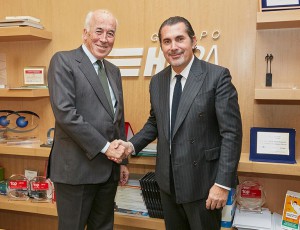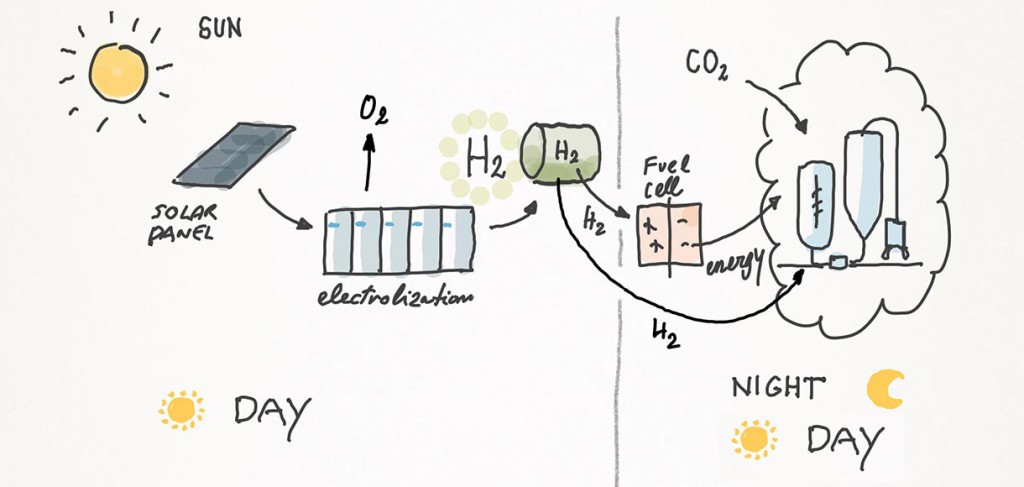Bio-on and Hera create Lux-on the new challenge to produce bioplastic from CO2
New company founded by Bio-on aiming to revolutionise the production of PHAs biopolymers using CO2 captured from the atmosphere
 Newco Lux-on created by Bio-on, alongside Gruppo Hera, to develop a revolutionary technology to produce biopolymers from CO2 (carbon dioxide).
Newco Lux-on created by Bio-on, alongside Gruppo Hera, to develop a revolutionary technology to produce biopolymers from CO2 (carbon dioxide).- Following 2 years of research by Bio-on scientists working in Italy and USA, the new technology uses CO2 freely available in the atmosphere as a carbon source to produce 100% natural and biodegradable bioplastic.
- CO2 is added to the other “raw materials” already used to make Bio-on bioplastic: sugar beet and sugar cane molasses, fruit and potato waste, carbohydrates, glycerol and waste frying oil. Using CO2 will also help reduce the amount of carbon dioxide in the atmosphere.
- Lux-on’s bioplastic production will rely solely on renewable solar energy and, thanks to a hydrogen energy management system, will run 24/7.
Bio-on, a leader in the high quality bioplastic sector, and Gruppo Hera, one of Italy’s largest multi-utility providers, have reached an agreement to take 90% and 10% shares respectively (with the possibility of Hera increasing its share to 49.9%) in LUX-ON, the new company founded by Bio-on aiming to revolutionise the production of PHAs biopolymers using CO2 captured from the atmosphere and producing energy without using fossil fuels.
The new technology developed by Bio-on envisages using carbon dioxide as a zero cost “raw material”, in addition to those already used to produce Bio-on bioplastic: sugar beet and sugar cane molasses, fruit and potato waste, carbohydrates, glycerol and waste frying oil. Using CO2 will also help reduce the amount of carbon dioxide in the atmosphere.
The laboratories and first plant of the new Lux-on project will be built by the end of 2019 close to the Bio-on Plants industrial facility at Castel San Pietro Terme (Bologna). It will be designed entirely by Bio-on technicians in collaboration with Hera, with carbon capture plants and a production facility using renewable solar energy. The development of the technology will be aided by the fact that many of the principles and equipment used in the standard technology can also be used in Lux-on’s new production systems. This is why the development and pre-industrial phase will be much faster than usual. The plant will occupy an area of 1,500 m2, 600 m2 of which is covered, and will have a flexible production capacity that is rapidly expandable.
The electric energy used in Lux-on’s innovative production process will be produced by photovoltaic systems which, aside from directly powering production, will also provide storable energy for nocturnal power (24/7 production). For energy storage, partnerships will be entered into with international experts in hydrogen (H) technology. Hydrogen, a non-polluting gas, will be produced from solar energy, stored and then converted to electric energy to power the plant when the solar panels are not running, i.e. at night or when light levels are poor.
“We are extremely pleased to work with HERA,” explains Bio-on S.p.A. Chairman and CEO Marco Astorri. “The great technological innovation used at Lux-on enables us to increase the industrial sustainability of a new production concept. We are particularly proud to realise humanity’s dream to capture CO2 from the atmosphere and produce innovative materials like our PHAs biopolymer. We are ready to face this new challenge, which will further extend our client base in the coming years, consolidating Italy’s global leadership in high quality biopolymer production.”
Following a year of major agreements, fast-growing company Bio-on, is set to begin 2019 with new strategic projects, including its collaboration with Hera.
The agreement also envisages a second development line aimed at identifying sustainable by-products for biopolymer production. Renamed PHA-CEL by Hera, this consists in transforming cutting and pruning cellulose into simple sugars that can then be used in fermentation following an enzymatic treatment. This process is made possible by the treatment technology, developed by Gruppo Hera, which is also assessing how to apply it to biogas and biomethane production from cuttings and prunings.
All the PHAs (polyhydroxyalkanoates) developed by Bio-on are made from renewable plant sources with no competition with food supply chains, and from CO2 in the coming years. They can replace a number of conventional polymers currently made with petrochemical processes using hydrocarbons; they guarantee the same thermo-mechanical properties as conventional plastics with the advantage of being completely eco-sustainable and 100% naturally biodegradable.
The agreement between the two companies has come out of a highly dynamic territory that represents the technological cutting edge in Italy to be exported around the world.
“For Gruppo Hera, which uses innovation and sustainability as the foundations of its multi-utility business,” explained Tomaso Tommasi di Vignano, Executive President of Gruppo Hera, “taking a share in the new company founded by Bio-on is the representation of a natural coming together of intentions and an alliance that we believe can be developed successfully beyond our territory and across various sectors. With the breadth and quality of our services, this agreement will give further, fundamental green credentials to a project like Lux-on, which aims to change the bioplastics world, not to mention the joint commitment to transform cuttings and prunings. Considering that Hera collects 200 thousand tons of cuttings and prunings every year, which can be transformed into bioplastic using our technology, this sector has huge growth potential.”
Further technical information is available in a video at: www.lux-on.com

About Gruppo Hera
It is one of Italy’s largest multi-utility providers working in Environment (waste collection and treatment), Energy (electricity and gas distribution and sale) and Water (waterworks, sewers and purification). The Group employs over 9,000 people and works every day to meet the many and varied needs of over 4.4 million citizens. It serves over 350 local municipalities mainly in the Emilia Romagna, Marche, Tuscany, Abruzzo, Veneto and Friuli Venezia Giulia regions.
About Bio-on S.p.A.
Bio-On S.p.A., an Italian Intellectual Property Company (IPC), operates in the bioplastic sector conducting applied research and development of modern bio-fermentation technologies in the field of eco-sustainable and completely naturally biodegradable materials. In particular, Bio-On develops industrial applications through the creation of product characterisations, components and plastic items. Since February 2015, Bio-On S.p.A. has also been operating in the development of natural and sustainable chemicals for the future. Bio-On has developed an exclusive process for the production of a family of polymers called PHAs (polyhydroxyalkanoates) from agricultural waste (including molasses and sugar cane and sugar beet syrups).
The bioplastic produced in this way is able to replace the main families of traditional plastics in terms of performance, thermo-mechanical properties and versatility. Bio-On PHAs is a bioplastic that can be classified as 100% natural and completely biodegradable: this has been certified by Vincotte and by USDA (United States Department of Agriculture). The Issuer’s strategy envisages the marketing of licenses for PHAs production and related ancillary services, the development of R&D (also through new collaborations with universities, research centres and industrial partners), as well as the realisation of industrial plants designed by Bio-On.
Source: Bio-on, press release, 2018-12-10.
